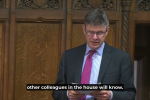Stroke has recently made the headlines again as new figures published by Public Health England showed that more first-time strokes are occurring at an earlier age compared to a decade ago. The average age for men having a stroke fell from 71 to 68 years and for women, 75 to 73 years. This is a very worrying trend, especially when people are generally living longer and healthier lives.
Stroke is the leading cause of death and disability in the UK – there are around 32,000 stroke-related deaths in England each year and 3,000 patients are treated for stroke each year in Kent & Medway hospitals.
Successful treatment relies on speed – the shorter the time between the stroke and treatment, the greater the chance of reducing damage to brain tissue. The medical saying goes "time lost is brain lost".
The way local stroke services are currently organised is not fit for purpose. One in three stroke patients are not getting brain scans in the recommended time – within an hour after arriving at hospital - and half of patients are not getting clot busting drugs in the recommended time - within 2 hours of calling the ambulance.
This is clearly unacceptable and I have been pressing our local NHS to make improvements.
The problem is that specialist resources are stretched too thinly across six hospital sites. Only one hospital out of the six currently meets the national threshold of seeing 500 stroke patients a year.
A Kent & Medway Stroke Review has been completed and the resulting plans published to radically overhaul the service with the opening of three specialist stroke units across the county operating 24 hours a day, 365 day a year.
Apart from emergency treatment, the new stroke units would also provide specialist rehabilitation which is vitally important for patients' long-term recovery and transient ischaemic attack (TIA) – "mini-stroke" – clinics operating 7 days a week.
Establishing specialist stroke units is a model that has been successfully applied years ago, with great success, in other countries, and more recently in other parts of the UK, including London - where it is estimated that 100 lives a year have been saved since the changes were put into place.
Whilst the Kent & Medway proposals do not come without a cost - it will require a capital investment of up to £40m - in the long-term the overall cost of stroke services should reduce as patients will have a better outcome and won't need as much long-term care. It's in everyone's interests to upgrade our stroke service.
Five options have been put forward for a combination of the three possible sites which the local NHS think are deliverable - two include Tunbridge Wells Hospital and two Maidstone Hospital. The option which does not include any hospital in West Kent is, to my mind, the weakest of the five as travel times are longer as our catchment area extends well over the border into East Sussex.
Indeed, the best travel times are provided by the option which involves Medway Maritime, William Harvey and Tunbridge Wells hospitals so it is this one that I personally favour. This option also comes out top in terms of the quality of care assessment.
You can see all the options on the following website: www.kentandmedway.nhs.uk/stroke - the consultation ends on Friday 13 April.
We have a once in a life opportunity to transform stroke care in our county and it's important that we get it right. I urge you, therefore, to look at the proposals and make your views known.


